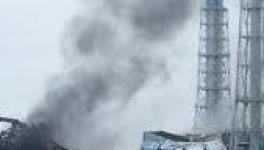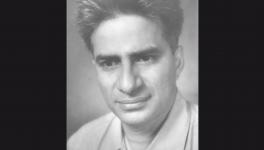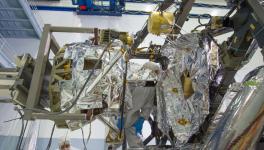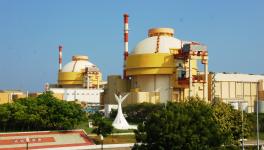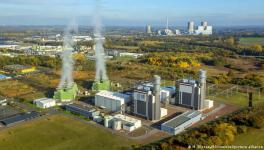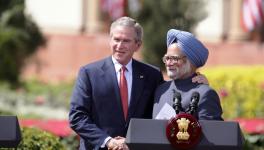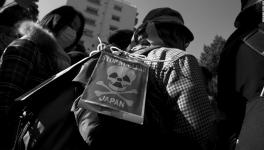Complete independence of AERB an imperative
Dr. A. Gopalakrishnan, former chairman of the Atomic Energy Regulatory Board talks to Newsclick about safety and regulatory imperatives in the nuclear energy sector in the country apropos the Fukushima nuclear accident in Japan.
Transcript-
Prabir Purkayastha (PP) - Hello and welcome to Newsclick. We have with us Dr. Gopalakrishnan, former chairman of the Atomic Energy Regulatory Board and one of our leading nuclear experts. Gopal, Fukushima disaster really brings out the importance of nuclear safety and independence of the regulator, because one of the problems that TEPCO had was that the regulators were too cosy with TEPCO. There are a lot of issues that has come out now, which were hidden. Effectively, safety was underplayed by the regulator. In India, we had a worse problem. We have a regulator which is subservient to the Atomic Energy Commission. Do you think that in any country which wants a nuclear energy program of large size, this is a healthy situation?
A.Gopalakrishnan (AG) - Not at all. Actually ever since nineteen-ninety-five I myself have been, more or less, on a crusade to make it independent from the department of atomic energy. There was once a small committee set up by Dr. Ramanna, Dr. Abdul Kalam and others and they very quickly came out with a result saying that no there's no need for any change. It was really not examined properly at all. But I think Fukushima brings it back into focus and only detailed analysis, subsequently, will show this partial subservience of regulators which was seen in Japanese case, also to what extent it has hurt the situation there. That will be worth examining, but it's too early. In this country, certainly, as you said, the Atomic Energy Regulatory Board is directly reporting to the secretary, DAE. And as such it is formally not independent.
Interestingly, India has signed the convention on nuclear safety and they ratified it in two thousand and five and section eight point two of the convention very clearly says that the country who is a member should have a regulatory agency which should be totally independent from the promotional agency. In our case, the DAE is the promotional agency. By the way, I was the chairman of the drafting committee at that time. And this was the consensus of not only the developing nations but many of the developing countries welcomed this actually it is the push from developing countries which included this articulate. And I distinctly remember that the Sri Lankan representative was very much pushing for this and after this clause was put in he said now we can breathe easy because you are building Kunnamkulam reactors there and at least we can now hope that your regulator will independently look at it. But sad to tell him today that situation has not changed. We have entered into a convention but our regulator has not changed.
Hopefully the government is seized with this and what I understand is that at least cosmetically then and make a separation but what I will be closely watching is, after that separation is made, whether indeed behavioral changes do take place in the AERB or not. That if they are going to act even without that link formally, they still continue the old habit of acting like a lap dog to the Department of Atomic Energy, then I think people like us have to really get after the AERB to make sure that they operate independently.
There are various signals of when somebody starts operating independently. You can see minutes of their safety meetings, reviews etc. on their websites or we will insist they should put it there. Basically, transparency. The public should know what they're doing, including the problems that they're sighting and problems they are finding and what solutions they are doing etc. should be there.
PP - Earlier there were two major accidents that we know of, may be there are more than that. One is the Kaiga dome collapse and the second was a fire at Narora, where the reactor was shut down manually by the workers and technicians. Now both are serious accidents and do show that there are serious regulatory oversights, in this sense, that are taking place. Has any change taken place with respect to Atomic Energy Commission or the AERB after these two major accidents.
AG - Not much at all, Prabir. What has happened is even at that time, in spite of reports, the accident investigation reports clearly brought out the failures which took place. The Department of Atomic Energy as well as the Atomic Energy Commission sort of rushed it to the site. They didn't deny it, they accepted the report, but did not take any action based on that. For one thing, the crew in Narora really saved a meltdown of the reactor. It speaks very highly of the kind of training that PHW engineers have received in this country and I had recommended from the AERD that these people should be rewarded in some way, but the department of atomic energy's response was that if we set them apart like that then it will look like we are admitting something horrible was going to happen there, which was really the case. But you know these kinds of things were really uppermost in their minds, rather than encouraging people who have taken safety actions. The same happened with the same contractor who made many mistakes in the Kaiga doom just after that. They continued to work, not only on that project, but many other projects, as if nothing had happened.
So I think one doesn't see from the AEC's side and Atomic Energy department's side, any corrective action or even a corrective thinking in that direction and that is continuing even today and this will have to go and once the AERB is made independent, I think that the punitive power will also have to be increased so that the Chairman and Board of Atomic Energy should be able to impose heavier fines. Even suspending people and dismissing people should be within the powers of the AERB, like many others.
PP - Coming back to the issue of the nuclear energy policy in this country, the major problems of this country, has been that the targets for nuclear energy have been decided politically. There really was no examination. How much do you need? What is the cost? What should be the unit size? These issues have not been examined and all that happened was we had a nuclear deal between India and the United States. The prime minister therefore said we must have x number of x thousand megawatts installed in certain number of years and these four major countries should be given four nuclear parks. That's been really the crux of the policy that we seemed to have followed. Do you think that this kind of policy which is driven essentially from the top is really, in the long run, healthy for our country or the nuclear energy sector?
AG - Not at all. What you have said is a very good summary of what exactly happened during the Indo US nuclear deal days. The Americans were promised ten thousand megawatt. Sarkozy of France even succeeded in specifying that EPRs are the ones we should buy. Otherwise, there were other excellent French reactors, which based on techno economics we would have picked some other reactor of France, if at all we have to go to France. But France was very badly looking for markets for the EPR, having spent so much money in it's development and our Prime Minister was made to agree to that as a purchasing of six EPRs as a condition for France helping us with NSG. So it is really a politically driven program which is coming. Now you see all the problems which it is going to raise. A reactor which has never been built anywhere, even till today and we have already signed an agreement to build two of them. I think that it doesn't make any technical sense at all and as far as the economics is concerned this whole question of economy of size is not there at all because it is going to cost at least minimum of twenty crores per megawatt, whereas our PSWRs would cost eight crore per megawatt. And even a very good imported coal station would cost probably four, four and a half, five crores per megawatt.
So I think if you look at the total policy. Who is setting energy policy today I think in most of these decisions, that I need forty thousand megawatts of imported reactors to avoid electricity shortage in twenty-fifty. That's the theme that one keeps hearing from the department. Who appointed the DAE to be the energy policy makers of the country? There are other ministries like Ministry of Power. There is Ministry of Renewable Energy Resources, the Ministry of Coal, all these people. I have never seen a single discussion between all these at a technical level, to really sit down and discuss. The Prime Minister seems to have some kind of a committee under him, which is an energy policy committee or something. It has a fancy name, but it turned out that the policy committee was created actually about a week before the Prime Minister went into America in July, 2005 and that committee was ultimately to rubber stamp the deal- ‘We need this kind of a deal and we need this kind of reactor imports for this’ and having done that the committee seem to have wound up because we don't see any action from them.
So I think the whole thing was to attain certain political objectives. We are moving in certain directions. Already it is very clear that this will lead to very big problems and Fukushima should be a turning point where we should go back and look at these policies again. One other element of this policy is what is the true energy demand? We are working on some artificial notion that India should have six thousand kilowatt hour per person per year in the year two thousand fifty. Now this is a number which is plucked from the sky. One builds up these things sector wise, to see how much power you would require. How much electricity would you require? How much would you conserve? How much can you save? All this comes into that determination. Only after realistically determining what your demand is should you start apportioning what energy mix you want and we have not any of these things.
PP - That, in fact, is the only calculation done till 2032, which has been done by the planning commission. Coming back to the issue that we raised earlier, that with the ad hoc policy measures being taken, we have also seen a very close correspondence, a very close relationship with the department of atomic energy. The people who are taking decisions and the vendors and this really came about because the political deal of the nature that were being signed, with the United States, the French and even with the Russians. So effectively what we see is the distant that should have been there between the vendor and the buyer seems to have disappeared with the common intention of convincing the Indian people about the need for nuclear power and large amounts of it.
AG - Yes, I think it is rightly said that normally in the correct atmosphere the seller and the buyer should be facing each other and going through hard negotiations to pin down what the cost should be, what the terms and conditions of purchases should be. And also what particular technical features they should have and what liability costs are to be imposed. Now, today we get an impression that this is all we sit together and engineer it together in a closed room, rather than have an open discussion.
I don't know other than this any financial representative; independent representatives from the finance ministry or other agency's are involved in these discussions. This leads you to the major difficulty that there is no reason why the civilian nuclear sector should be under the official secrets act. Even today after all these years we are maintaining that. We are talking about a sector about which IAE knows everything and the Americans know even more about it, because of Indo US deal. So I think it is only hidden from the Indian public to a great extent. I think we should knock it off and one of the primary changes which are required is that the civilian nuclear sector, like NTPC power stations, Hydro power stations should be out of this. Certainly, they should take it out from the official secrets act, except for certain things like layout of the plant that may come in handy for a terrorist organization to attack that.
After all the France is having a very open regulation of civilian sector. With the Americans, the NRC is doing that and the only change after 9/11 to the NRC Website is that they removed some of the detailed drawings of the reactors and layout of the reactors. Everything else is out for public information. They had cut away sections; lay out of pipes in all the sections. All those they have removed because, with internal collusion, somebody can break the pipe. Somebody can do something to that reactor. So they have sifted through to make sure that there is nothing useful for a terrorist action on that installation and rest of the things are open, including the minutes to every single meeting they have. The deficiencies that they have pointed out, the answers which came from the operator. Everything is visible there for people to read and that should be the situation here too. Both safety and the economics of nuclear power have absolutely no reasons to be put under either the Official Secrets Act or be kept away from the people.
So what we really need for a proper nuclear energy sector would be transparency on the safety issues and transparency on the economics. On what basis we are reaching this. In short every country worth its name, at least in the nuclear sector, they're being extremely transparent because they feel that transparency is at the heart of minimising a risk. At the heart of getting opinions from as wide a segment of people as possible, because you cannot run a nuclear program, these days especially, without the complete cooperation of the local communities who surround these, because many of the problems come from surrounding communities and people there and i think you cannot have a conflict situation existing in any nuclear site present or future between local communities and the management of that facility. We are moving in diametrically the opposite direction.
Every site of ours has now opposition building and they write it off as political but it is not political. I think people are becoming wiser. They are aware of how the rest of the world operates and they can clearly see that this government is not being transparent and it leads to the right kind of suspicions, that that is corruption going on here, that they are probably deficiencies in this plant, which are being covered up. One should remove these if indeed there is no corruption and indeed there is nothing to be covered up then I think that would be the wisest thing that that atomic energy department and the Government of India can do is to make it totally transparent.
PP - Thanks Gopal, I think this has been a very interesting discussion and we will come back on lot of these issues in the next few months. Thank you.
Get the latest reports & analysis with people's perspective on Protests, movements & deep analytical videos, discussions of the current affairs in your Telegram app. Subscribe to NewsClick's Telegram channel & get Real-Time updates on stories, as they get published on our website.










